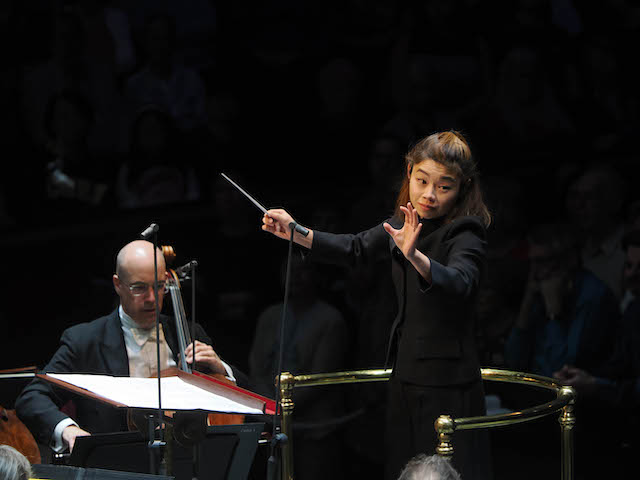One of the undoubted highlights of Prom 14 was unprogrammed – following his commanding performance of Beethoven’s third piano concerto, Jan Lisiecki returned to the stage to give an encore of Chopin’s Nocturne in E Flat, Opus 9 No 2.
There was a rapt silence as he played this intimate work to the packed hall, perfectly balancing the golden singing tones of the upper notes with the ebb and flow of emotion driven by the rising chords in the bass. It was a moment that seemed to show where this remarkable pianist – who made his professional debut aged nine – feels spiritually at home; no surprise, perhaps, given that the Canadian was raised by Polish parents. Now, at the age of 28, this impromptu delivery gave a full sense of the range of a performer who first recorded both of Chopin’s piano concertos when he was just 15.
It was tellingly different to the account he gave of Beethoven’s stirring C minor concerto – a key deployed by the composer in some of his most dramatic works, including the Pathétique Sonata and Symphony No. 5. Right from the start, the BBC Symphony Orchestra – conducted by Elim Chan (pictured below) – indicated that this was going to be a deft, elegant interpretation, more stern than heroic, with a rigorous sense of structure.
Lisiecki is an interesting pianist to watch, not least because of his relationship with the orchestra. When he wasn’t playing he was scrutinising them as if he was a fascinated member of the audience, often swaying in time to the music. After an authoritative delivery of the opening C minor scales, he brought a rich sheen to the lyrical passage accompanied by triplets before graduating to a more detached rendition of the rising G major arpeggios in the bass.
Throughout this opening movement there was a sense of such precision, you could almost hear each bar line. The recurring dotted rhythms of the opening theme were deployed with military strictness and the ornaments were as crisp as they were vigorous. Very occasionally, in the more virtuoso passages, you were aware that Lisiecki was a whisper ahead of the orchestra. Yet his cadenza was dazzling and in the moment when the orchestra came in again it felt as if he was playing with the resonance and delicacy of spun glass. There was more warmth in the Largo, with its beautiful, meditative opening, but it was still defined by a certain neatness. The concerto is thought to have been composed between 1800 and 1803, a point when Beethoven was starting to struggle with his hearing, and some critics see the work’s intense drama as a reflection of his suffering at the time. This interpretation however very much tipped its hat to the classical aspects of the composer’s work rather than excavating its more tortured, romantic side. Its tone felt like finely carved wood more than velvet, an exercise in restraint.
There was more warmth in the Largo, with its beautiful, meditative opening, but it was still defined by a certain neatness. The concerto is thought to have been composed between 1800 and 1803, a point when Beethoven was starting to struggle with his hearing, and some critics see the work’s intense drama as a reflection of his suffering at the time. This interpretation however very much tipped its hat to the classical aspects of the composer’s work rather than excavating its more tortured, romantic side. Its tone felt like finely carved wood more than velvet, an exercise in restraint.
Lisiecki raised the pulse with a vigorous galloping entry into the final movement, a rondo in which the fury of the first movement and the poetic melancholy of the second is resolved in an ultimately buoyant, optimistic conclusion. As throughout, his performance was heightened by the generosity of his dialogue with the orchestra, so that every echo and response written into the score rang out.
The evening began with one of this year’s 15 new commissions for the Proms, Noriko Koide’s Swaddling Silk and Gossamer Rain. Chan skilfully guided the orchestra through a work which was every bit as subtle in texture as the title suggests. It began with a single meditative note on the vibraphone that was picked up, after a long silence, by a note on the harp. Then there was a wonderful passage in which the brass and wind players blew into their instruments so softly that we could only hear the sound of their breath echoing through the wood and metal, while the strings played a muted pizzicato.
What ensued felt sometimes meditative, sometimes almost hallucinatory – subtle glissandi on the strings and the occasional eery siren-like wail of the woodwind alternating with more bell-like passages. If this was a time of day, it would be dusk rather than the full heat of the midday sun. At the end the orchestra briefly swelled before fading away again. It would be fascinating to hear this in a smaller venue – the pleasing delicacy of the texture suggested it might also be a good candidate for an ASMR video.
The final piece of the evening was Elgar’s Enigma Variations, and it was here that the BBC Symphony Orchestra came into its own. After the stately, graceful statement of the opening theme, in which the soaring cello solos in particular sang out, we were into the pleasant summer garden-tones of the movement dedicated to the composer's wife, Alice, who famously helped inspire the whole work. Movements like the full-blooded fourth, dedicated to Elgar’s friend William Meath Baker, were filled with passion and urgency, while there was an elegiac soulfulness to movements like the sixth, written for the viola player Isabel Fitton.
The infamous Nimrod was performed with such fine-wrought beauty that at times it felt that if you breathed in the wrong way you wouldn’t hear it. One of many special moments in an evening full of subtle delights.














Add comment